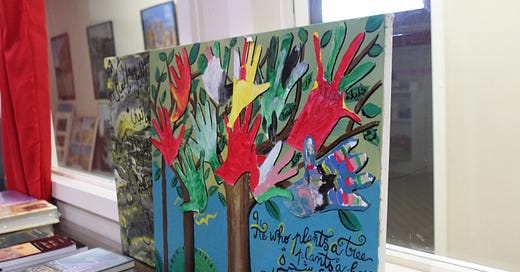“I act sad at school. I don’t really want to talk about it.”
At a youth support group off I-85, Arab American kids describe how war thousands of miles away is impacting their lives.

Amenah Arman is a mental health professional with her own therapy practice. A Palestinian American who lived in the West Bank as a child, she moved to Metro Atlanta, via Chicago, in 2003.
On Saturday, in a room at the Alif Institute, a non-profit that promotes awareness about the Arab Middle East, she was leading a group therapy session.
Around a half dozen middle school and high school students, all with Arab roots, sat around a table to talk about what has been consuming their thoughts over the last two weeks: the deaths of over 5,000 Palestinians and 1,400 Israelis.
In Gaza, currently under Israeli bombardment after the October 7 attacks by Hamas, local psychiatrists are reporting that kids they’re seeing are experiencing “serious trauma symptoms such as convulsions, bed-wetting, fear, aggressive behavior, nervousness, and not leaving their parents’ sides.”
The trauma of the war is traveling and reaching kids here - through their phones and through the stories they’re hearing from their families. And Amenah has decided to offer free therapy to community members, in this case, youth.
The kids, five of whom were Palestinian American and two of whom were Syrian American, had taken time out of a sunny Saturday afternoon to come to the session. As they nibbled on chocolate chip cookies, they began to share some of the issues they had been grappling with recently.
Many had been struggling to balance what they were hearing from their families and seeing on their social media feeds about the violence in the region, with their everyday lives.
“I act sad [at school]. But I don’t really want to talk to anyone about it,” said an 11-year old Palestinian American girl. “It’s hard to be with people who are complaining about dumb things. Why complain when people are dying? It feels so ridiculous.” She was struggling to see the relevance of the subjects she was learning. “How can math or geography help people who are dying?”
The high school students in the group had their own phones, and said they compulsively checked their TikTok and Instagram feeds throughout the day. One student said that in the initial days after October 7, he had to restrict his phone use, because the images and videos were overwhelming. Now, he said, videos of the violence were mixed in with photos his friends were posting of their dogs and hanging out.
Amenah says what the kids - as well as many adults - are experiencing is secondary trauma.
“When you're subjected to these images, technically, you're not there. But your nervous system doesn't necessarily understand that. So you're absorbing it, the sounds, the graphic details, the colors, the tears, you're absorbing it as if you are there. Even if you tell yourself to put the phone down, you're going to pick it back up, or you're going to hear other people talking about it.”
Amenah said her own child was impacted, complaining of feeling listless and sometimes having difficulty breathing.
Some of the kids talked about how the violence thousands of miles away was impacting their relationships here.
“Friends think of our culture in a way that’s not positive,” said one high schooler.
Another high school student said she didn’t want to share her thoughts on the war with her Jewish friend. “I knew if I said anything, it would ruin our friendship.” She wasn’t sure if she had done the right thing. “Maybe I was cowardly,” she added.
Amenah herself has been at a loss of how to act. “I am forcing myself to show up for salah (prayer). I'm forcing myself to take a shower. Everything is forced right now. Nothing feels natural.”
Her dad, she said, has been burying himself in work. “Everyone has different ways of processing it.” What’s important, she said, is giving yourself the space to grieve and not isolating yourself. “It’s a united grief.”
At the end of the two hour session, the kids were in agreement about what they needed: more time with people who understood what they were going through.





Thank you, as always, Sophia, for shining a light on what our neighbors are experiencing, impacted by intense loss across the world.